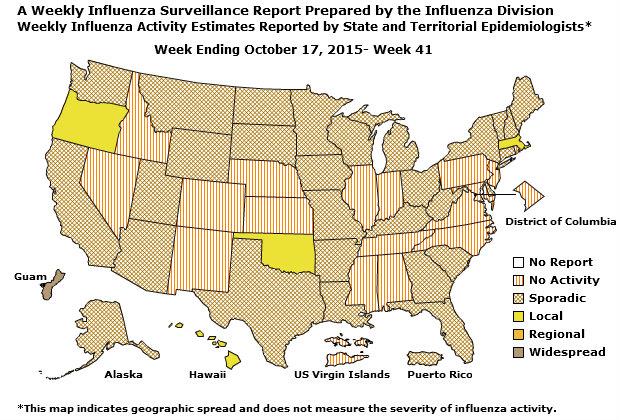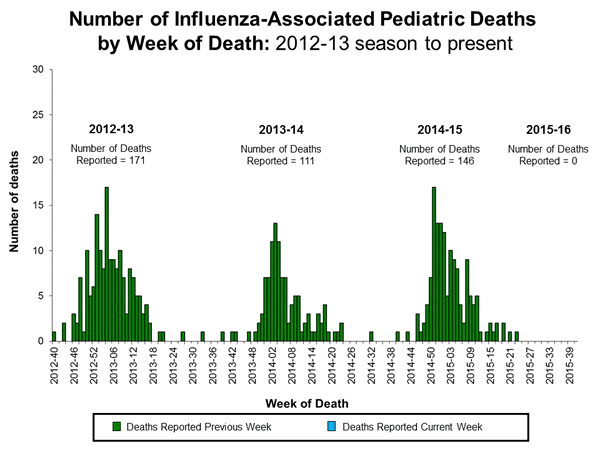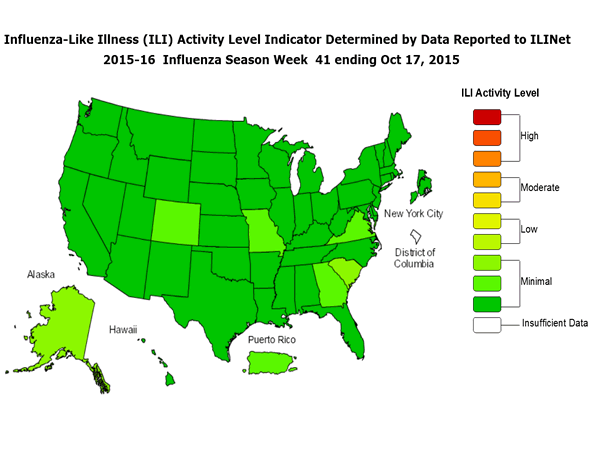
2015-2016 Influenza Season Week 41 ending October 17, 2015
All data are preliminary and may change as more reports are received.
Synopsis:
During week 41 (October 11-17, 2015), influenza activity was low in the United States.
- Viral Surveillance: The most frequently identified influenza virus type reported by public health laboratories in week 41 was influenza A viruses, with influenza A (H3) viruses predominating. The percentage of respiratory specimens testing positive for influenza in clinical laboratories is low.
- Pneumonia and Influenza Mortality: The proportion of deaths attributed to pneumonia and influenza (P&I) was below their system-specific epidemic threshold in both the NCHS Mortality Surveillance System and the 122 Cities Mortality Reporting System.
- Influenza-associated Pediatric Deaths: No influenza-associated pediatric deaths were reported.
- Outpatient Illness Surveillance: The proportion of outpatient visits for influenza-like illness (ILI) was 1.4%, which is below the national baseline of 2.1%. All 10 regions reported ILI below region-specific baseline levels. Puerto Rico, New York City and 50 states experienced minimal ILI activity and the District of Columbia had insufficient data.
- Geographic Spread of Influenza:The geographic spread of influenza in Guam was reported as widespread; four states reported local activity; Puerto Rico and 29 states reported sporadic activity; and the District of Columbia, the U.S. Virgin Islands and 17 states reported no influenza activity.
National and Regional Summary of Select Surveillance Components
| HHS Surveillance Regions* | Data for current week | Data cumulative since October 4, 2015 (week 41) | ||||||||
|---|---|---|---|---|---|---|---|---|---|---|
| Out-patient ILI† | Number of jurisdictions experiencing high or moderate ILI activity§ | % respiratory specimens positive for flu in clinical laboratories‡ | A(H1N1)pdm09 | A (H3) | A (Subtyping not Performed |
B Victoria lineage | B Yamagata lineage | B lineage not performed | Pediatric Deaths | |
| Influenza test results from public health laboratories only | ||||||||||
| Nation | Normal | 0 of 53 | 1.7% | 4 | 45 | 4 | 1 | 1 | 1 | 0 |
| Region 1 | Normal | 0 of 6 | 1.4% | 0 | 6 | 0 | 0 | 0 | 0 | 0 |
| Region 2 | Normal | 0 of 4 | 0.4% | 0 | 2 | 0 | 0 | 0 | 0 | 0 |
| Region 3 | Normal | 0 of 6 | 0.5% | 1 | 2 | 1 | 0 | 0 | 0 | 0 |
| Region 4 | Normal | 0 of 8 | 2.2% | 0 | 4 | 0 | 0 | 1 | 1 | 0 |
| Region 5 | Normal | 0 of 6 | 1.0% | 3 | 8 | 1 | 0 | 0 | 0 | 0 |
| Region 6 | Normal | 0 of 5 | 1.0% | 0 | 5 | 0 | 1 | 0 | 0 | 0 |
| Region 7 | Normal | 0 of 4 | 0.7% | 0 | 3 | 1 | 0 | 0 | 0 | 0 |
| Region 8 | Normal | 0 of 6 | 0.6% | 0 | 4 | 1 | 0 | 0 | 0 | 0 |
| Region 9 | Normal | 0 of 4 | 3.8% | 0 | 6 | 0 | 0 | 0 | 0 | 0 |
| Region 10 | Normal | 0 of 4 | 1.0% | 0 | 5 | 0 | 0 | 0 | 0 | 0 |
*HHS regions (Region 1 CT, ME, MA, NH, RI, VT; Region 2: NJ, NY, Puerto Rico, US Virgin Islands; Region 3: DE, DC, MD, PA, VA, WV; Region 4: AL, FL, GA, KY, MS, NC, SC, TN; Region 5: IL, IN, MI, MN, OH, WI; Region 6: AR, LA, NM, OK, TX; Region 7: IA, KS, MO, NE; Region 8: CO, MT, ND, SD, UT, WY; Region 9: AZ, CA, Guam, HI, NV; and Region 10: AK, ID, OR, WA).
† Elevated means the % of visits for ILI is at or above the national or region-specific baseline
§ Includes all 50 states, the District of Columbia, Guam, Puerto Rico, and U.S. Virgin Islands
‡ National data are for current week; regional data are for the most recent three weeks
U.S. Virologic Surveillance:
WHO and NREVSS collaborating laboratories, which include both public health and clinical laboratories located in all 50 states, Puerto Rico, and the District of Columbia, report to CDC the total number of respiratory specimens tested for influenza and the number positive for influenza virus type. In addition, public health laboratories also report the influenza A subtype (H1 or H3) and influenza B lineage information of the viruses they test and the age or age group of the persons from whom the specimens were collected.
Additional data are available at http://gis.cdc.gov/grasp/fluview/fluportaldashboard.html..
The results of tests performed by clinical laboratories during the current week are summarized below.
| Week 41 | Data Cumulative since October 4, 2015 (Week 40) |
|
|---|---|---|
| No. of specimens tested | 7,998 | 17,482 |
| No. of positive specimens (%) | 138 (1.7%) | 249 (1.4%) |
| Positive specimens by type | ||
| Influenza A | 101 (73.2%) | 180 (72.3%) |
| Influenza B | 37 (26.8%) | 69 (27.7%) |
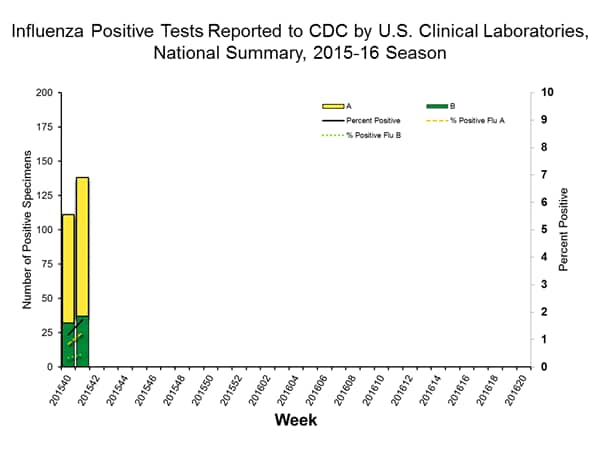
View National and Regional Level Graphs and Data | View Chart Data | View Full Screen | View PowerPoint Presentation
The results of tests performed by public health laboratories, as well as the age group distribution of influenza positive tests, during the current week are summarized below.
| Week 41 | Data Cumulative since October 4, 2015 (Week 41) |
|
|---|---|---|
| No. of specimens tested | 444 | 1,067 |
| No. of positive specimens | 19 | 56 |
| Positive specimens by type/subtype | ||
| Influenza A | 18 (94.7%) | 53 (94.6%) |
| A(H1N1)pmd09 | 1 (5.6%) | 4 (7.5%) |
| H3 | 14 (77.8%) | 45 (84.9%) |
| Subtyping not performed | 3 (16.7%) | 4 (7.5%) |
| Influenza B | 1 (5.3%) | 3 (5.4%) |
| Yamagata lineage | 0 (0%) | 1 (33.3%) |
| Victoria lineage | 1 (100%) | 1 (33.3%) |
| Lineage not performed | 0 (0%) | 1 (33.3%) |
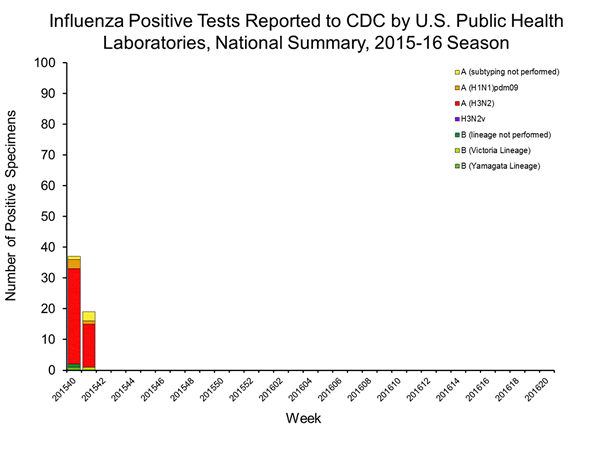
View National and Regional Level Graphs and Data | View Chart Data | View Full Screen | View PowerPoint Presentation
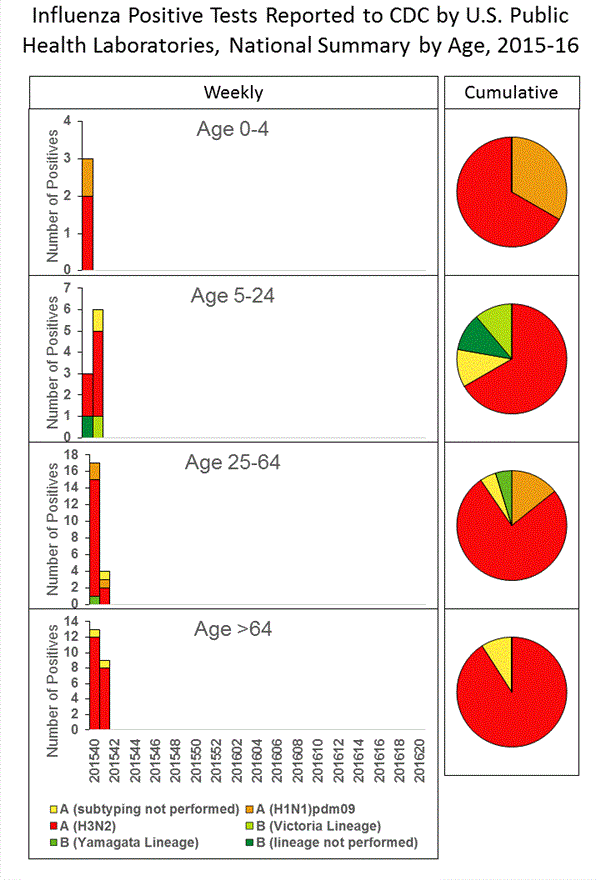
View Chart Data | View Full Screen
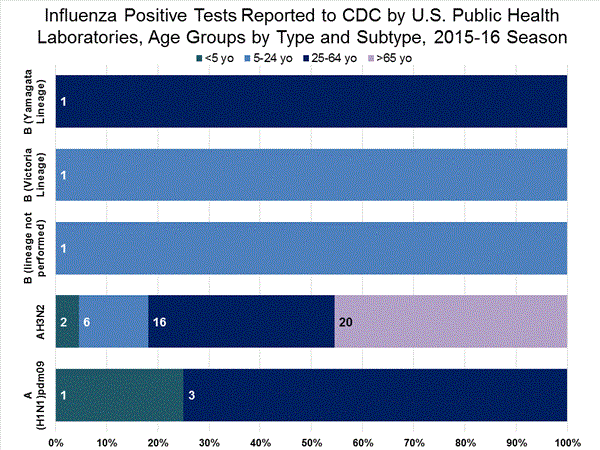
View Chart Data | View Full Screen
Influenza Virus Characterization:
CDC characterizes influenza viruses through one or more tests including genome sequencing, hemagglutination inhibition (HI) and/or neutralization assays. This data is used to compare how similar currently circulating influenza viruses are to the reference viruses used for developing influenza vaccines, and to monitor for changes in circulating influenza viruses. Historically HI data has been used most commonly to assess the similarity between reference viruses and circulating viruses as a proxy for vaccine effectiveness. Beginning in the 2014–2015 season and to date, however, a portion of influenza A (H3N2) viruses do not yield sufficient hemagglutination titers for antigenic characterization by HI. For many of these viruses, CDC performs genetic characterization to determine the genetic group identity of circulating viruses. In this way, antigenic properties of these viruses can be inferred from viruses within the same genetic group that have been characterized antigenically.
No characterization data is currently available for specimens collected after October 1, 2015.
During May 24-Septemer 30, 2015, CDC has characterized 225 influenza viruses [8 A (H1N1)pdm09, 155 A (H3N2), and 62 influenza B viruses] collected by U.S. laboratories.
Influenza A Virus [163]
- A (H1N1)pdm09 [8]: All 8 (100%) influenza A (H1N1)pdm09 viruses were antigenically characterized as A/California/7/2009-like, the influenza A (H1N1) component of the 2015-2016 Northern Hemisphere.
- A (H3N2) [155]: All 155 H3N2 viruses were genetically sequenced and all viruses belonged to genetic groups for which a majority of viruses antigenically characterized were similar to A/Switzerland/9715293/2013, the influenza A (H3N2) component of the 2015-2016 Northern Hemisphere vaccine.
- A subset of 60 H3N2 viruses also were antigenically characterized; all 60 (100%) H3N2 viruses were A/Switzerland/9715293/2013-like by HI testing or neutralization testing.
Influenza B Virus [62]: Thirty-eight (61%) of the influenza B viruses characterized belonged to B/Yamagata/16/88 lineage and the remaining 24 (39%) influenza B viruses characterized belonged to B/Victoria/02/87 lineage.
Yamagata Lineage [38]: All 38 (100%) B/Yamagata-lineage viruses were antigenically characterized as B/Phuket/3073/2013-like, which is included as an influenza B component of the 2015-2016 Northern Hemisphere trivalent and quadrivalent influenza vaccines.
Victoria Lineage [24]: All 24 (100%) B/Victoria-lineage viruses were antigenically characterized as B/Brisbane/60/2008-like, the virus that is included as an influenza B component of the 2015-2016 Northern Hemisphere quadrivalent influenza vaccine.
Antiviral Resistance:
No antiviral resistance data is available for specimens collected after October 1, 2015. During May 24-Septemer 30, 2015, 192 specimens (8 influenza A (H1N1)pdm09, 118 influenza A (H3N2), and 66 influenza B viruses) collected in the United States were tested for susceptibility to the neuraminidase inhibitors (oseltamivir, zanamivir, and peramivir). None of the tested viruses were found to be resistant to either oseltamivir, zanamivir, or peramivir.
The majority of recently circulating influenza viruses are susceptible to the neuraminidase inhibitor antiviral medications, oseltamivir, zanamivir, and peramivir; however, rare sporadic instances of oseltamivir-resistant and peramivir-resistant influenza A (H1N1)pdm09 and oseltamivir-resistant influenza A (H3N2) viruses have been detected worldwide. Antiviral treatment is recommended as early as possible for patients with confirmed or suspected influenza who have severe, complicated, or progressive illness; who require hospitalization; or who are at high risk for serious influenza-related complications. Additional information on recommendations for treatment and chemoprophylaxis of influenza virus infection with antiviral agents is available at http://www.cdc.gov/flu/antivirals/index.htm.
Pneumonia and Influenza (P&I) Mortality Surveillance:
Rapid tracking of pneumonia and influenza-associated deaths is done through two systems, the National Center for Health Statistics (NCHS) Mortality Surveillance System and the 122 Cities Mortality Reporting System. NCHS mortality surveillance data are presented by the week the death occurred and P&I percentages are released two weeks after the week of death to allow for collection of enough data to produce a stable P&I percentage. Users of the data should not expect the two systems to produce the same percentages, and the percent P&I deaths from each system should be compared to the corresponding system-specific baselines and thresholds.
NCHS Mortality Surveillance Data:
Based on NCHS mortality surveillance data available on October 22, 2015, 5.6% of the deaths occurring during the week ending October 3, 2015 (week 39) were due to P&I. This percentage is below the epidemic threshold of 6.3% for week 39.
Region and state-specific data are available at http://www.cdc.gov/flu/weekly/nchs.htm.
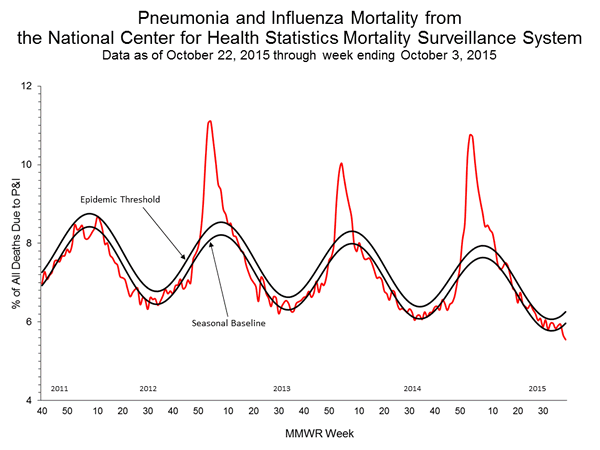
View Regional and State Level Data | View Chart Data | View Full Screen | View PowerPoint Presentation
122 Cities Mortality Reporting System:
During week 41, 5.7% of all deaths reported through the 122 Cities Mortality Reporting System were due to P&I. This percentage was below the epidemic threshold of 6.0% for week 41.
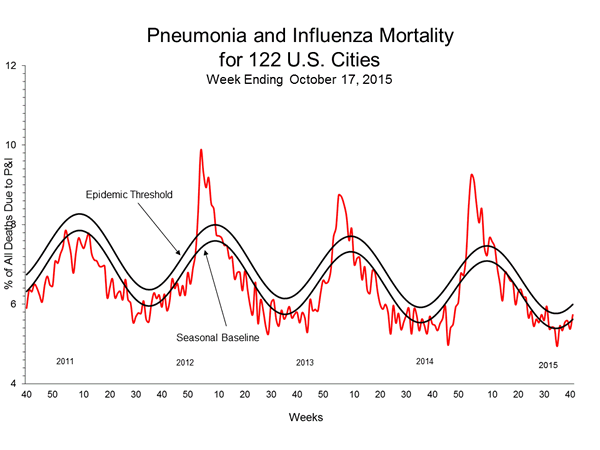
View Full Screen | View PowerPoint Presentation
Influenza-Associated Pediatric Mortality:
No influenza-associated pediatric deaths were reported to CDC during week 41.
Additional data can be found at: http://gis.cdc.gov/GRASP/Fluview/PedFluDeath.html.Influenza-Associated Hospitalizations:
The Influenza Hospitalization Surveillance Network (FluSurv-NET) conducts all age population-based surveillance for laboratory-confirmed influenza-related hospitalizations in select counties in the Emerging Infections Program (EIP) states and Influenza Hospitalization Surveillance Project (IHSP) states. FluSurv-NET estimated hospitalization rates will be updated weekly starting later this season. Additional FluSurv-NET data can be found at: http://gis.cdc.gov/GRASP/Fluview/FluHospRates.html and http://gis.cdc.gov/grasp/fluview/FluHospChars.html.
Outpatient Illness Surveillance:
Nationwide during week 41, 1.4% of patient visits reported through the U.S. Outpatient Influenza-like Illness Surveillance Network (ILINet) were due to influenza-like illness (ILI). This percentage is below the national baseline of 2.1%.
(ILI is defined as fever (temperature of 100°F [37.8°C] or greater) and cough and/or sore throat.)
Additional data are available at http://gis.cdc.gov/grasp/fluview/fluportaldashboard.html.
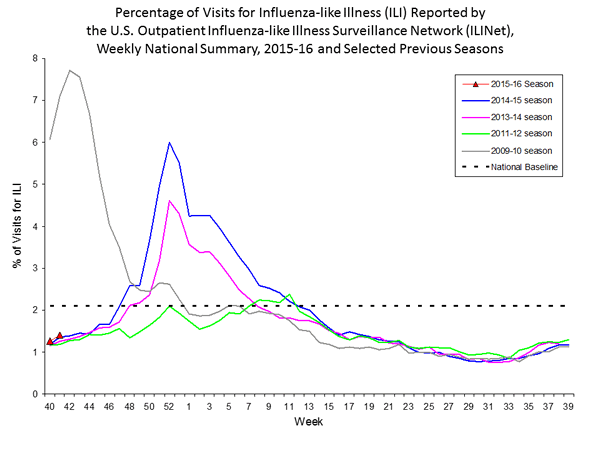
View National and Regional Level Graphs and Data | View Chart Data | View Full Screen | View PowerPoint Presentation
On a regional level, the percentage of outpatient visits for ILI ranged from 0.5% to 2.9% during week 41. All 10 regions reported a proportion of outpatient visits for ILI below their region-specific baseline levels.
ILINet State Activity Indicator Map:
Data collected in ILINet are used to produce a measure of ILI activity* by state. Activity levels are based on the percent of outpatient visits in a state due to ILI and are compared to the average percent of ILI visits that occur during weeks with little or no influenza virus circulation. Activity levels range from minimal, which would correspond to ILI activity from outpatient clinics being below, or only slightly above, the average, to high, which would correspond to ILI activity from outpatient clinics being much higher than average.
During week 41, the following ILI activity levels were calculated:
- New York City, Puerto Rico and all 50 states experienced minimal ILI activity.
- Data were insufficient to calculate an ILI activity level from the District of Columbia.
*This map uses the proportion of outpatient visits to health care providers for ILI to measure the ILI activity level within a state. It does not, however, measure the extent of geographic spread of flu within a state. Therefore, outbreaks occurring in a single city could cause the state to display high activity levels.
Data collected in ILINet may disproportionally represent certain populations within a state, and therefore, may not accurately depict the full picture of influenza activity for the whole state.
Data displayed in this map are based on data collected in ILINet, whereas the State and Territorial flu activity map is based on reports from state and territorial epidemiologists. The data presented in this map is preliminary and may change as more data are received.
Differences in the data presented here by CDC and independently by some state health departments likely represent differing levels of data completeness with data presented by the state likely being the more complete.
Geographic Spread of Influenza as Assessed by State and Territorial Epidemiologists
The influenza activity reported by state and territorial epidemiologists indicates geographic spread of influenza viruses, but does not measure the severity of influenza activity.
During week 41, the following influenza activity was reported:
- Widespread influenza activity was reported by Guam.
- Local influenza activity was reported by four states (Hawaii, Massachusetts, Oklahoma, and Oregon).
- Sporadic influenza activity was reported by the Puerto Rico and 29 states (Alaska, Arizona, Arkansas, California, Connecticut, Delaware, Florida, Georgia, Iowa, Kentucky, Louisiana, Maine, Michigan, Minnesota, Missouri, Montana, New Hampshire, New York, North Dakota, Ohio, South Carolina, South Dakota, Texas, Utah, Vermont, Washington, West Virginia, Wisconsin, and Wyoming).
- No influenza activity was reported by the District of Columbia, the U.S. Virgin Islands, and 17 states (Alabama, Colorado, Idaho, Illinois, Indiana, Kansas, Maryland, Mississippi, Nebraska, Nevada, New Jersey, New Mexico, North Carolina, Pennsylvania, Rhode Island, Tennessee, and Virginia).
